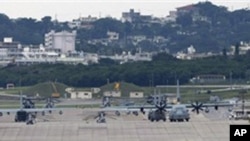The United States and Japan have agreed to drop a 2014 deadline for completing the relocation of a critical U.S. Marine base on the southern Japanese island of Okinawa. The agreement, aimed at easing a thorny issue in bilateral relations, came at meeting of the two countries’ foreign and defense ministers in Washington.
Implementation of the base deal, intended to ease the impact of U.S. forces on Okinawa, has been delayed by Japanese politics, including protests by islanders that it does not go far enough to reduce base-related noise and pollution.
The agreement announced here is a recognition that the 2014 completion date cannot be met. But it also commits Japan to complete the costly project “at the earliest possible date” after 2014, and to help underwrite the relocation of some U.S. troops to Guam.
The anticipated compromise deal was announced at a closing news conference of a two-day meeting of the Pacific allies’ foreign and defense ministers, hosted by Secretary of State Hillary Clinton.
Defense Secretary Robert Gates said he and Clinton raised a recent letter by key U.S. Senators suggesting the base deal be re-examined because of delays and cost-overruns.
“The letter from Senators [Jim] Webb and [Carl] Levin about the realignment is really a manifestation of growing Congressional impatience with the lack of progress. We both reaffirmed the U.S. government’s commitment to the 2006 realignment plan, but at the same time emphasized the importance of concrete progress over the next year,” Gates said.
The so-called two-plus-two meeting was the first between the two allies in four years, and the first involving ministers of the Democratic Party of Japan, which has been often been critical of the U.S. military presence.
But Japanese Defense Minister Toshimi Kitazawa said the DPJ is now committed to fulfilling the deal, despite continued local opposition from Okinawan politicians, some of whom want U.S. forces off the island altogether.
“Opinions in Okinawa are very harsh, and we confirmed in our meeting today at we will make our best effort to try and get the understanding of Governor [Hirokazu] Nakaima of Okinawa, and the local people there. The purpose of U.S. realignment, as I mentioned earlier, is to maintain deterrence and to reduce the local impact, the local burden,” Kitazawa said.
Under the 2006 accord, the U.S. Marine base at Futenma, Okinawa - which adjoins an urban area - will be moved to a more remote site on the northern part of the island. The sides said they have reached agreement on the runway configuration for the new U.S. base.
Analysts say Japanese concerns about the U.S. presence has eased in recent months, owing to aggressive North Korean actions, an expanded Chinese naval presence in the region, and massive U.S. aid to Japan following its earthquake disaster in March.
A joint statement from the “two-plus-two” meeting said U.S.-Japanese military aid operations after the earthquake had given “new confidence” to the 50-year-old alliance.
It cited an increasingly uncertain security environment in the region due in part to North Korea’s missile and nuclear programs and “provocative behavior.”
The statement said the United States and Japan seek a responsible and constructive Chinese regional security role that adheres to “international norms of behavior,” as well as openness and transparency in China’s military modernization program.
US, Japan Agree to Drop Base Relocation Deadline









